Jesus Born December
The month of December holds a special place in the hearts of millions as the time of Christmas, a season filled with joy, giving, and togetherness. Central to this celebration is the birth of Jesus Christ, a cornerstone of Christian faith. While December 25th is universally recognized as the date of Jesus’ birth, the historical and theological basis for this date has been a topic of much discussion and study.
Historical Context of Jesus’ Birth
The Bible does not explicitly state the date of Jesus’ birth. The Gospels of Matthew and Luke, which provide the most detailed accounts of His nativity, focus on the events surrounding His arrival, such as the angelic proclamation to Mary, the journey to Bethlehem, and the visit of the shepherds and Magi. The absence of a specific date in the scriptures has led scholars to examine historical and cultural clues to estimate when Jesus might have been born.
One of the arguments supporting a December birth is the timing of the census mentioned in Luke 2:1-4. Some historians suggest that a census during winter months would be less practical due to weather conditions, raising questions about the traditional date. However, others argue that Roman administrative activities were not necessarily influenced by seasonal concerns, leaving room for December as a plausible period.
Early Christian Traditions
The celebration of December 25th as Jesus’ birthday was first recorded in the fourth century. Early Christians likely selected this date for multiple reasons. One significant factor was its alignment with the Roman festival of Sol Invictus, which celebrated the “Unconquered Sun.” By adopting December 25th, early Christians reinterpreted the day as honoring the birth of the true “Light of the World,” as Jesus is described in John 8:12.
Another possible explanation is the Jewish belief that great prophets died on the same date as their conception. Given that early Christians marked March 25th as the date of the Annunciation—the angel’s announcement to Mary—the addition of nine months brings us to December 25th as a natural conclusion for Jesus’ birth.
Symbolism of December
Even if the exact historical date remains uncertain, December as a time for celebrating Jesus’ birth carries profound symbolic meaning. The winter solstice, occurring just days before Christmas, marks the year’s shortest day and the gradual return of light. This natural phenomenon resonates deeply with the message of Jesus’ coming as the light breaking through the world’s darkness.
In many cultures, December is associated with themes of renewal and hope. These align beautifully with the Christian narrative of Jesus’ birth, which heralds a new covenant between God and humanity. The imagery of a baby born in humble circumstances yet destined to transform the world captures the essence of faith and hope that Christmas represents.
Faith and Celebration
For Christians, the significance of Jesus’ birth transcends historical debates. December provides a time to reflect on the incarnation—God taking human form—and the profound love and humility this act represents. Through worship, acts of kindness, and family traditions, believers honor the miracle of Christ’s birth and its enduring impact on humanity.
From candlelit church services to nativity plays, the story of Jesus’ birth continues to inspire devotion and creativity. While the exact date may remain a mystery, the choice of December as the time for this celebration emphasizes themes of light, hope, and renewal that resonate across generations and cultures.
In conclusion, whether Jesus was indeed born in December or another time of year, the essence of His birth lies in its transformative message. December’s symbolism and traditions make it a fitting time to remember and celebrate the arrival of the Savior who brings light and hope to the world.

